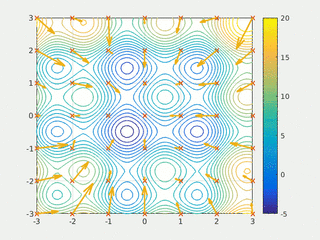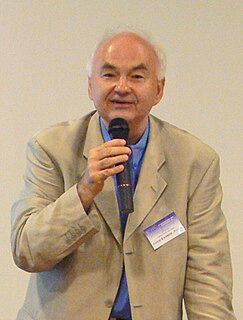The Association for Computing Machinery (ACM) is a US-based international learned society for computing. It was founded in 1947, and is the world's largest scientific and educational computing society. The ACM is a non-profit professional membership group, claiming nearly 100,000 student and professional members as of 2019. Its headquarters are in New York City.
Fuzzy logic is a form of many-valued logic in which the truth values of variables may be any real number between 0 and 1 both inclusive. It is employed to handle the concept of partial truth, where the truth value may range between completely true and completely false. By contrast, in Boolean logic, the truth values of variables may only be the integer values 0 or 1.

Lotfi Aliasker Zadeh was a mathematician, computer scientist, electrical engineer, artificial intelligence researcher and professor emeritus of computer science at the University of California, Berkeley.

In computational science, particle swarm optimization (PSO) is a computational method that optimizes a problem by iteratively trying to improve a candidate solution with regard to a given measure of quality. It solves a problem by having a population of candidate solutions, here dubbed particles, and moving these particles around in the search-space according to simple mathematical formulae over the particle's position and velocity. Each particle's movement is influenced by its local best known position, but is also guided toward the best known positions in the search-space, which are updated as better positions are found by other particles. This is expected to move the swarm toward the best solutions.
Computational semiotics is an interdisciplinary field that applies, conducts, and draws on research in logic, mathematics, the theory and practice of computation, formal and natural language studies, the cognitive sciences generally, and semiotics proper. The term encompasses both the application of semiotics to computer hardware and software design and, conversely, the use of computation for performing semiotic analysis. The former focuses on what semiotics can bring to computation; the latter on what computation can bring to semiotics.
The expression computational intelligence (CI) usually refers to the ability of a computer to learn a specific task from data or experimental observation. Even though it is commonly considered a synonym of soft computing, there is still no commonly accepted definition of computational intelligence.
Genetic fuzzy systems are fuzzy systems constructed by using genetic algorithms or genetic programming, which mimic the process of natural evolution, to identify its structure and parameter.
IEEE Intelligent Systems is a bimonthly peer-reviewed academic journal published by the IEEE Computer Society and sponsored by the Association for the Advancement of Artificial Intelligence, British Computer Society, and European Coordinating Committee for Artificial Intelligence. The journal was established in 1986 as the quarterly IEEE Expert, changed to a bimonthly in 1990, changed its name to IEEE Intelligent Systems & Their Applications in 1997. It obtained its current name in 2001. The editor-in-chief is V.S. Subrahmanian. According to the Journal Citation Reports, the journal has a 2017 impact factor of 2.596.
In recent years, the use of biologically inspired methods such as the evolutionary algorithm have been increasingly employed to solve and analyze complex computational problems. BELBIC is one such controller which is proposed by Caro Lucas, Danial Shahmirzadi and Nima Sheikholeslami and adopts the network model developed by Moren and Balkenius to mimic those parts of the brain which are known to produce emotion.

Brian R. Gaines is a British scientist, engineer, and Professor Emeritus at the University of Calgary.
Knowledge retrieval seeks to return information in a structured form, consistent with human cognitive processes as opposed to simple lists of data items. It draws on a range of fields including epistemology, cognitive psychology, cognitive neuroscience, logic and inference, machine learning and knowledge discovery, linguistics, and information technology.
Lateral computing is a lateral thinking approach to solving computing problems. Lateral thinking has been made popular by Edward de Bono. This thinking technique is applied to generate creative ideas and solve problems. Similarly, by applying lateral-computing techniques to a problem, it can become much easier to arrive at a computationally inexpensive, easy to implement, efficient, innovative or unconventional solution.

Benedikt Löwe is a German mathematician and logician working at the Universities of Amsterdam, Hamburg, and Cambridge. He is known for his work on mathematical logic and the foundations of mathematics, as well as for initiating the interdisciplinary conference series Foundations of the Formal Sciences and Computability in Europe.

The International Conference on Computational Intelligence Methods for Bioinformatics and Biostatistics (CIBB) is a yearly scientific conference focused on machine learning and computational intelligence applied to bioinformatics and biostatistics.
This glossary of artificial intelligence is a list of definitions of terms and concepts relevant to the study of artificial intelligence, its sub-disciplines, and related fields. Related glossaries include Glossary of computer science, Glossary of robotics, and Glossary of machine vision.

Janusz Kacprzyk is a Polish engineer and mathematician, notable for his multiple contributions to the field of computational and artificial intelligence tools like fuzzy sets, mathematical optimization, decision making under uncertainty, computational intelligence, intuitionistic fuzzy sets, data analysis and data mining, with applications in databases, ICT, mobile robotics and others.

Ismat BegFPAS,FIMA, is a Pakistani mathematician and researcher. Beg is Professor at the Lahore School of Economics, Higher Education Commission Distinguished National Professor and an honorary full professor at the Mathematics Division of the Institute for Basic Research, Florida, US.
Ebrahim (Abe) H. Mamdani was a mathematician, computer scientist, electrical engineer and artificial intelligence researcher. He worked at the Imperial College London.







